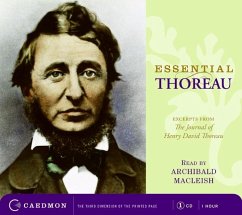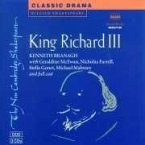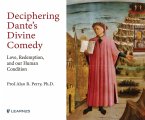One Great Author. One Great CD. "'What are you doing now?' he asked. 'Do you keep a journal?' So I make my first entry today." With these words, in response to prodding from Ralph Waldo Emerson, Henry David Thoreau embarked on a writing enterprise?his Journal?that occupied him continuously over the entire period of his literary career, from 1837 to 1862. In one sense Thoreau's Journal is his greatest achievement as a writer, the remarkable record of a remarkable man's view of the world. Ranging in topic from entries titled "Young Women at Parties" to "Sunlight after Storm", the Journal is neither diary nor autobiography in the usual meaning of these terms, because the daily chronicle and the narrative of outward events are minor aspects of this voluminous work. The Journal is clearly not the work of a diarist, but the notebook of a writer dedicated to the continuous practice of composition.
Bitte wählen Sie Ihr Anliegen aus.
Rechnungen
Retourenschein anfordern
Bestellstatus
Storno






